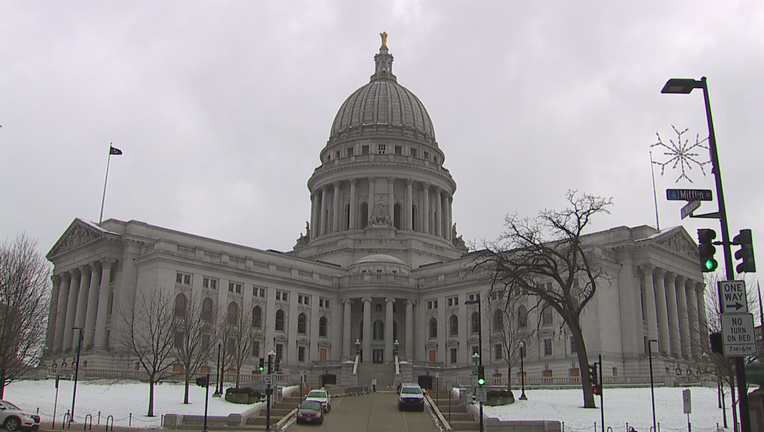Bipartisan push in Legislature for ranked-choice voting in Wisconsin

Wisconsin State Capitol, Madison
MADISON, Wis. - The push for ranked-choice voting in Wisconsin gained steam on Wednesday with the introduction of a bipartisan bill in the state Legislature, a move backed by a Republican congressman and a recently formed coalition of civic and business leaders.
It’s the first time Republicans have got behind the idea in Wisconsin’s GOP-controlled Legislature. A measure introduced by Democrats last session didn’t even get a hearing.
Supporters are keeping their expectations in check, given how new the idea is in Wisconsin, but they feel the vitriolic partisan political environment means this is the right time for change.
"It’s going to take some time for people to understand what we’re proposing," said Austin Ramirez, the CEO of Husco International in Waukesha and co-founder of Democracy Found. The Wisconsin-based group of civic and business leaders that was formed less than two years ago has been pushing the idea as part of its agenda to force Democrats and Republicans away from political extremes.
Here’s how it works: Instead of holding partisan primaries, where Republicans and Democrats separately vote for their candidates, everyone running appears on the same ballot. Voters select their favorite candidate, regardless of political party, and the top five finishers advance to the general election.
At that election, voters can rank their favorites in order of preference from first to fifth. If one candidate gets a majority of first-place votes, the election is over. If no one has a majority, there is an instant run-off where the lowest vote-getter is eliminated and anyone who had that person as their top choice instead has their second favorite candidate counted.
FREE DOWNLOAD: Get breaking news alerts in the FOX6 News app for iOS or Android
The votes are counted again and that process continues until someone reaches a majority of the votes. Under the current system, the highest vote-getter wins even if they don’t have a majority. But under ranked-choice, the winner isn’t determined until someone has more than 50% of the vote, even if some voters initially ranked them as their second or lower choice.
Proponents argue that ranked-choice voting would make elections less politically polarized, increase third party, women and minority candidates and reduce negative campaigning. Critics, who have largely been Republican, say the system is too complicated for voters and could be abused by those who want to game it.
Bill co-sponsor, Republican state Sen. Dale Kooyenga, of Brookfield, said moving away from a partisan primary would mean candidates don't have to cater to political extremes. With the threat of a primary challenge removed, politicians would have more incentive to appeal to voters in the middle, he said.
"We’re a purple state," Kooyenga said. "This is a bill that I think a lot of Wisconsin residents are going to look at."
Still, he acknowledged that changing how Wisconsin votes is "going to be a tough fight. I think everyone involved with this knows that."
Another Republican, Rep. Tony Kurtz, and two Democrats — Sen. Jeff Smith and Rep. Daniel Riemer — are co-sponsoring the measure with Kooyenga.
Similar proposals have been introduced in 28 states so far this year, according to FairVote, a nonpartisan group that has advocated for the change as a way to improve elections.
Maine became the first state to have ranked-choice voting for a presidential election last year and is the only state that currently has it in place for congressional elections as well. Twenty cities, including Minneapolis, also have ranked-choice voting and starting this year it will be used in New York City, according to FairVote.
A handful of other cities recently approved ranked-choice voting, as did voters in Alaska. It will be used for all legislative and statewide elections starting in 2022 and for the presidential election in 2024.
The Wisconsin bill would only pertain to federal elections for U.S. Senate and U.S. Representatives to Congress.
U.S. Rep. Mike Gallagher, a Republican representing northeast Wisconsin, supports the change, saying it "creates greater accountability to voters and rewards finding common ground."
"At a time of intense partisanship, we’re in dire need of solutions," Gallagher said in a statement. "This idea is not just a good place to start, but a way for our state to revitalize its rich history in political innovation."
Featured
Spirit Airlines to fly out of Milwaukee with non-stop flights to 3 cities
Spirit Airlines will begin flying out of Milwaukee Mitchell International Airport in June, officials announced on Wednesday, Feb. 24.
Featured
Third Space Brewing increases beer-making capacity amid pandemic
Third Space Brewing announced on Wednesday, Feb. 24 that it is increasing the four-year-old craft brewery’s brewing capacity to 18,000 barrels per year.

Contact 6 asks around about proof of vaccination requirements
A lot of people are looking forward to summer festivals, stadium events, and travel. But, what will it take for our favorite events to return to normal?



